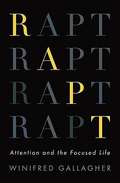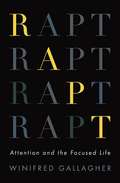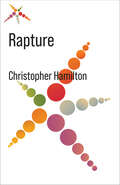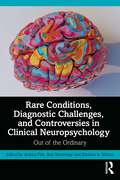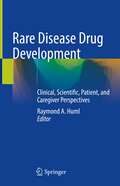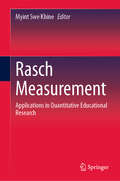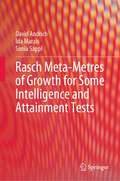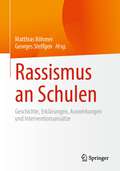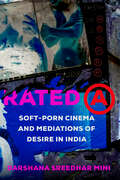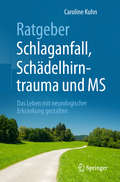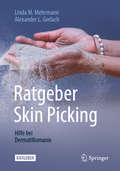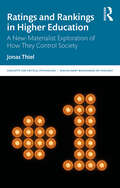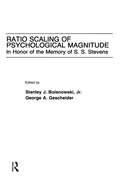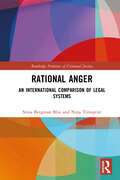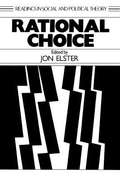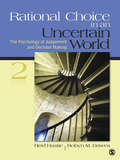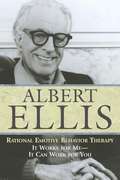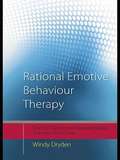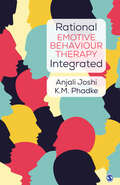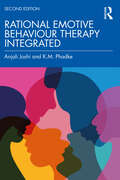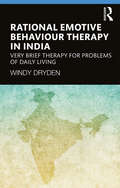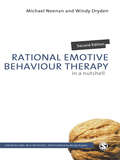- Table View
- List View
Rapt
by Winifred GallagherWinifred Gallagher revolutionizes our understanding of attention and the creation of the interested lifeIn Rapt, acclaimed behavioral science writer Winifred Gallagher makes the radical argument that the quality of your life largely depends on what you choose to pay attention to and how you choose to do it. Gallagher grapples with provocative questions-Can we train our focus? What's different about the way creative people pay attention? Why do we often zero in on the wrong factors when making big decisions, like where to move?-driving us to reconsider what we think we know about attention. Gallagher looks beyond sound bites on our proliferating BlackBerries and the increased incidence of ADD in children to the discoveries of neuroscience and psychology and the wisdom of home truths, profoundly altering and expanding the contemporary conversation on attention and its power. Science's major contribution to the study of attention has been the discovery that its basic mechanism is an either/or process of selection. That we focus may be a biological necessity- research now proves we can process only a little information at a time, or about 173 billion bits over an average life-but the good news is that we have much more control over our focus than we think, which gives us a remarkable yet underappreciated capacity to influence our experience. As suggested by the expression "pay attention," this cognitive currency is a finite resource that we must learn to spend wisely. In Rapt, Gallagher introduces us to a diverse cast of characters-artists and ranchers, birders and scientists-who have learned to do just that and whose stories are profound lessons in the art of living the interested life. No matter what your quotient of wealth, looks, brains, or fame, increasing your satisfaction means focusing more on what really interests you and less on what doesn't. In asserting its groundbreaking thesis-the wise investment of your attention is the single most important thing you can do to improve your well-being-Rapt yields fresh insights into the nature of reality and what it means to be fully alive.
Rapt: Attention And The Focused Life
by Winifred GallagherAcclaimed behavioral science writer Gallagher makes the radical argument that the quality of a life largely depends on what and how one chooses to pay attention. "Rapt" yields fresh insights into the nature of reality and what it means to be fully alive.
Rapture (No Limits)
by Christopher HamiltonWhat is it like to experience rapture? For philosopher Christopher Hamilton, it is a loss of self that is also a return to self—an overflowing and emptying out of the self that also nourishes and fills the self. In this inviting book, he reflects on the nature of rapture and its crucial yet unacknowledged place in our lives.Hamilton explores moments of rapture in everyday existence and aesthetic experience, tracing its disruptive power and illuminating its philosophical significance. Rapture is found in sexual love and other forms of intense physical experience, such as Philippe Petit’s nerve-defying wire walk between the Twin Towers. Hamilton also locates it in quieter but equally joyous moments, such as contemplating a work of art or the natural world. He considers a range of examples in philosophy and culture—Nietzsche and Weil, Woolf and Chekhov, the extremes of experience in Werner Herzog’s films—as well as aspects of ordinary life, from illness to gardening. Conversational and evocative, this book calls on us to ask how we might make ourselves more open to experiences of rapturous joy and freedom.
Rare Conditions, Diagnostic Challenges, and Controversies in Clinical Neuropsychology: Out of the Ordinary
by Barbara A. Wilson Shai Betteridge Jessica FishThis book highlights those rare, difficult to diagnose or controversial cases in contemporary clinical neuropsychology. The evidence base relevant to this type of work is almost by definition insufficient to guide practice, but most clinicians will encounter such cases at some point in their careers. By documenting the experiences and learning of clinicians who have worked with cases that are ‘out of the ordinary’, the book addresses an important gap in the literature. The book discusses 23 challenging and fascinating cases that fall outside what can be considered routine practice. Divided into three sections, the text begins by addressing rare and unusual conditions, defined as either conditions with a low incidence, or cases with an atypical presentation of a condition. It goes on to examine circumstances where an accurate diagnosis and/or coherent case formulation has been difficult to reach. The final section addresses controversial conditions in neuropsychology, including those where there is ongoing scientific debate, disagreement between important stakeholders, or an associated high-stakes decision. This text covers practice across lifespan and offers crucial information on specific conditions as well as implications for practice in rare disorders. This book will be beneficial for clinical neuropsychologists and applied psychologists working with people with complex neurological conditions, along with individuals from medical, nursing, allied health and social work backgrounds. It will further be of appeal to educators, researchers and students of these professions and disciplines.
Rare Disease Drug Development: Clinical, Scientific, Patient, and Caregiver Perspectives
by Raymond A. HumlThis book provides a broad overview of rare disease drug development. It offers unique insights from various perspectives, including third-party capital providers, caregivers, patient advocacy groups, drug development professionals, marketing and commercial experts, and patients. A unique reference, the book begins with narratives on the many challenges faced by rare disease patient and their caregivers. Subsequent chapters underscore the critical, multidimensional role of patient advocacy groups and the novel approaches to related clinical trials, investment decisions, and the optimization of rare disease registries. The book addresses various rare disease drug development processes by disciplines such as oncology, hematology, pediatrics, and gene therapy. Chapters then address the operational aspects of drug development, including approval processes, development accelerations, and market access strategies. The book concludes with reflections on the authors' case for real-world data and evidence generation in orphan medicinal drug development. Rare Disease Drug Development is an expertly written text optimized for biopharmaceutical R&D experts, commercial experts, third-party capital providers, patient advocacy groups, patients, and caregivers.
Rasch Analysis in the Human Sciences
by William J. Boone John R. Staver Melissa S. YaleRasch Analysis in the Human Sciences helps individuals, both students and researchers, master the key concepts and resources needed to use Rasch techniques for analyzing data from assessments to measure variables such as abilities, attitudes, and personality traits. Upon completion of the text, readers will be able to confidently evaluate the strengths and weakness of existing instrumentation, compute linear person measures and item measures, interpret Wright Maps, utilize Rasch software, and understand what it means to measure in the Human Sciences. Each of the 24 chapters presents a key concept using a mix of theory and application of user-friendly Rasch software. Chapters also include a beginning and ending dialogue between two typical researchers learning Rasch, "Formative Assessment Check Points," sample data files, an extensive set of application activities with answers, a one paragraph sample research article text integrating the chapter topic, quick-tips, and suggested readings. Rasch Analysis in the Human Sciences will be an essential resource for anyone wishing to begin, or expand, their learning of Rasch measurement techniques, be it in the Health Sciences, Market Research, Education, or Psychology.
Rasch Measurement: Applications in Quantitative Educational Research
by Myint Swe KhineThis book focuses on the use of the Rasch measurement model in validation studies and in analyzing the psychometric properties of a variety of test instruments, questionnaires, and scales in international contexts. It broadly examines the development and application of Rasch modeling, providing in-depth analyses of the properties of various scales used in the fields of education, and humanities and social sciences research.The book includes exemplary works on educational research and practices that highlight recent and innovative applications, as well as theoretical and practical aspects of Rasch modeling. Readers will find it helpful to understand the latest approaches to Rasch measurement in educational research, as well as practices for future studies and quantitative research.'This book provides a diverse set of perspectives on Rasch models from scholars across the globe. The volume is both theoretical and applied. The first section of the book provides an overview of Rasch modeling and explains the theoretical and conceptual framework underlying the Rasch model. The remainder of the book highlights multiple applications of the Rasch model within educational assessment as well as several examples of how Rasch modeling can be used for validation studies. This volume showcases the wide variety of ways in which Rasch modeling can be applied to assessment data to provide insights into students’ achievement and learning and to improve instruction.'–Betsy McCoach, University of Connecticut, USA.'A well-written collection of articles. Grouped by the theoretical and applied aspects of Rasch measurement, each chapter in this edited volume makes notable contributions to knowledge and practice. Written by leading scholars in the field, these chapters were written in a clear, succinct, and assertive manner, providing readers with up-to-date information, analyses, and debates. This book should be found in the core collection of emerging researchers and established scholars in educational measurement.'–Timothy Teo, Murdoch University, Australia.
Rasch Meta-Metres of Growth for Some Intelligence and Attainment Tests
by David Andrich Ida Marais Sonia SapplThis book adapts Rasch’s approach for quantifying growth on physiological variables, where growth decelerates, to intellectual variables. To apply this approach, it is necessary to construct measurements in a constant unit over the relevant range of the variable. With such measurements, the book illustrates the approach to quantifying growth on six intellectual variables - two intelligences tests and two each of tests of proficiencies in reading comprehension and mathematics. The book discusses how it is not immediately obvious that deceleration on a quantitative scale should also hold for the growth in intellectual variables. It goes on to show that this is indeed the case with all six tests analysed and considers some implications of this feature for understanding intellectual development, in particular the centrality of the growth trajectory set in early life.
Rassismus an Schulen: Geschichte, Erklärungen, Auswirkungen und Interventionsansätze
by Matthias Böhmer Georges SteffgenRassismus, also Diskriminierung von Menschen aufgrund deren vermeintlicher ethnischer Herkunft, ist an Schulen allgegenwärtig. Neben Schüler*innen, Referendar*innen und Lehrer*innen sind mithin alle Akteur*innen im schulischen Kontext von dieser Thematik betroffen. Warum ist dem so? Wie lässt sich rassistische Diskriminierung erklären? Welche Auswirkungen hat dieses Verhalten auf Betroffene? Und wie kann Schule dem begegnen? All dies sind Fragen, die sich stellen und die in diesem Buch in der Absicht beantwortet werden sollen, allen im Schulkontext handelnden Personen eine kritische Auseinandersetzung mit den eigenen rassismusrelevanten Wissensbeständen zu ermöglichen. Dieses Buch trägt dazu bei, dass sich Schule zu einem rassismussensiblen Raum entwickelt, in dem sich alle Akteur*innen rassismussensibel verhalten. Daher werden neben einem Überblick über die Geschichte des Rassismus, Ansätze zur Erklärung von rassistischen Verhaltensweisen und Auswirkungen von rassistischer Diskriminierung auch Präventions- und Interventionsansätze für eine rassismuskritische Praxis in der Schule vorgestellt.
Rassismusbedingter Stress in Deutschland: Bewältigungsstrategien und Ressourcen aus der Sicht von Menschen mit Rassismuserfahrungen (BestMasters)
by Dunja KhouryWelche Rassismen erleben Schwarze Personen, Personen of Color und Asiatisch-Deutsche in Deutschland? Wie gehen Betroffene mit dem damit verbundenen Stress um? Welche Strategien der Bewältigung verwenden sie? Und welche Ressourcen nutzen sie zur Bewältigung von rassismusbedingtem Stress? Antworten auf diese Fragen finden sich in den Interviews, die diesem Buch zu Grunde liegen. Insbesondere durch den Ressourcenfokus zeigt Dunja Khoury die Vielfalt von personalen und umweltbezogenen Ressourcen auf, welche die Auswirkungen, die Rassismus auf die Gesundheit und das Selbstbild hat, abmildern, das eigene Wohlbefinden wieder zentrieren und ermöglichen, eine aktive, selbstermächtigende Rolle einzunehmen. Die Arbeit zeigt ein großes Spektrum an rassismusbezogenen Stressoren in der deutschen Gesellschaft auf und leitet wertvolle Implikationen für die Praxis ab.
Rated A: Soft-Porn Cinema and Mediations of Desire in India (Feminist Media Histories #8)
by Darshana Sreedhar MiniA free ebook version of this title is available through Luminos, University of California Press's Open Access publishing program. Visit www.luminosoa.org to learn more. In the 1990s, India's mediascape saw the efflorescence of edgy soft-porn films in the Malayalam-speaking state of Kerala. In Rated A, Darshana Sreedhar Mini examines the local and transnational influences that shaped Malayalam soft-porn cinema—such as vernacular pulp fiction, illustrated erotic tales, and American exploitation cinema—and maps the genre's circulation among blue-collar workers of the Indian diaspora in the Middle East, where pirated versions circulate alongside low-budget Bangladeshi films and Pakistani mujra dance films as South Asian pornography. Through a mix of archival and ethnographic research, Mini also explores the soft-porn industry's utilization of gendered labor and trust-based arrangements, as well as how actresses and production personnel who are marked by their involvement with a taboo form negotiate their social lives. By locating the tense negotiations between sexuality, import policy, and censorship in contemporary India, this study offers a model for understanding film genres outside of screen space, emphasizing that they constitute not just industrial formations but entire fields of social relations and gendered imaginaries.
Rated X: How Porn Liberated Me from Hollywood
by Maitland WardA celebrity memoir unlike any other, this is an empowering, sex-positive, behind-the-scenes look at both Hollywood and the porn industry. Perfect for fans of Pleasure Activism and How to Make Love Like a Porn Star.Maitland Ward got her start in acting as a teenager when she was cast in The Bold and the Beautiful, but it wasn&’t until she joined the later seasons of the sitcom Boy Meets World that she got her first taste of fame. As the loveable co-ed Rachel McGuire, Ward soon found herself being typecast as the good girl next door and was repeatedly denied darker, more intriguing roles. So she made a career change—one that required her to turn away from the Disney universe—and eventually established herself as one of the most-respected actresses in the porn industry today. Now, Ward reveals the ups and downs of her fascinating career, including personal stories from her time on one of the most beloved shows of the 1990s, in this anything but a run-of-the-mill memoir. By showing Hollywood and triple-X stardom in a whole new light, she offers a fresh and stirring perspective on the sex industry and &“champions the discovery of freedom in sexuality&” (Kirkus Reviews, starred review). Ultimately a story of hope and triumph, this is a sharp and provocative look at a former Disney princess who found her fairy tale in porn.
Ratgeber Schlaganfall, Schädelhirntrauma und MS: Das Leben mit neurologischer Erkrankung gestalten
by Peter Berlit Caroline KuhnDieses Buch bietet für medizinische Laien plausible Erklärungsmodelle für Hirnleistungsstörungen wie Schwindel, Gedächtnisprobleme, Müdigkeit oder Sehstörungen und fehlende Belastbarkeit. Damit der Alltag nach der Rehabilitationsphase gut gelingt, macht der Ratgeber verständlich, was im Gehirn passiert, wenn solche Probleme auftreten - zum Beispiel als Folgen von Schlaganfall oder einem Schädelhirntrauma, bei Multipler Sklerose oder einem Hirntumor. Das Buch bietet dem Betroffenen Lösungen und Strategien an, wie er damit gut umgehen und weiter am Leben teilnehmen kann. Mit vielen Übungen und Tipps für Betroffene und Angehörige, wie Probleme im Alltag entschärft und kritische Situationen gemeistert werden können.Ein Buch, das Mut macht, den Weg zurück in die aktive Gestaltung des Alltags und in den Beruf zu finden.
Ratgeber Skin Picking: Hilfe bei Dermatillomanie
by Linda M. Mehrmann Alexander L. GerlachPathologisches Hautzupfen und Hautquetschen – in der Fachsprache Dermatillomanie, auch Skin Picking genannt – ist eine Erkrankung, bei der Betroffene wiederholt ihre eigene Haut bearbeiten, knibbeln, quetschen. Sie folgen dabei einem starken inneren Drang, dem sie nur schwer Widerstand entgegensetzen können, und leiden sehr unter den Folgen, etwa Schuld- und Schamgefühle, Wunden- und Narbenbildung. Dieser Ratgeber richtet sich an Betroffene, deren Angehörige und alle, die beispielsweise als Psychotherapeut oder Hautarzt Berührungspunkte mit Skin Picking haben. Sie finden hierin alle wichtigen Informationen zu Skin Picking sowie eine Anleitung zur Selbsthilfe mit vielen praktischen Tipps und Übungen. Aus dem Inhalt: Informationen rund um Skin Picking – Strategien gegen das Knibbeln: Knibbelstopp – Rückfallprophylaxe. Die Autoren:Linda M. Mehrmann und Prof. Dr. rer. nat. Alexander L. Gerlach sind Psychologische Psychotherapeuten (Verhaltenstherapie) und helfen seit vielen Jahren Skin-Picking-Patienten.
Ratings and Rankings in Higher Education: A New-Materialist Exploration of How They Control Society (Concepts for Critical Psychology)
by Jonas ThielThis important work critically investigates the use of rating and ranking systems in higher education to show how they govern the academic population through the creation of competition and antagonism. From social media to PISA and Rotten Tomatoes, ratings and rankings exist everywhere in our daily lives. Seemingly benign in practice, they can structure and govern important parts of society, including social interaction, public health and economic rankings. In this essential critique, author Jonas Thiel sets out the case against these practices, using the UK’s higher education model to show how tools such as the National Student Surveys (NSS) instead divide the academic population to make it governable and controllable. Instead of achieving its intended aim of improving teaching by forcing competition over student satisfaction, Thiel shows that systems like the NSS have a profound and often negative impact upon how people and institutions understand themselves. Drawing on the new materialist theory of Karen Barad, Foucault’s governmentality and Laclau’s understanding of antagonism, the book raises an urgent need to respond to these boundary-drawing practices, especially in light of rising inequality and ecological collapse, and poses the question: can we even imagine a world without 'Top 10' rankings and 'out of 5' scores? Engaging with current debates around ‘value’, tuition fees and the role of higher education in society, this is fascinating reading for advanced students and academics in psychology, education, sociology and philosophy.
Ratio Scaling of Psychological Magnitude: In Honor of the Memory of S.s. Stevens
by George A. Gescheider Stanley J. BolanowskiPresenting the proceedings of a conference held at Syracuse University in honor of S.S. Stevens, a pioneer in the scaling of sensory magnitudes and the originator of the method of magnitude estimation, this volume brings together the work of 20 authorities on the procedures of ratio scaling. These experts--psychophysicists, physiologists, and theoreticians--offer their views on whether or not psychological magnitudes can be measured and whether the judgments of psychological magnitudes constitute the basis for the construction of a ratio scale. Also discussed is the question of whether any single method could stand out as a potential standard technique for measuring psychological magnitudes.
Rational Anger: An International Comparison of Legal Systems (Routledge Frontiers of Criminal Justice)
by Stina Bergman Blix Nina TörnqvistExploring the rationales behind legal anger, its logic and origins, this book builds on the perspectives of judges and prosecutors in Italy, Sweden, the United States, and Scotland.When do judges and prosecutors become angry in court, what do they become angry about, and which other emotions open up for anger? Anger brings people to court and is essential in evaluating wrongdoing and attributing blame, but at the same time, anger is seen as a threat to well-reasoned and just decision-making. Drawing on observations, interviews, and shadowing of legal professionals, the text demonstrates how anger is entangled with legal thought and comes into play in legal practices. By comparing the workings and displays of anger found in different legal systems and emotional cultures, the book elucidates assumptions about law, morality, truth, and emotions that we commonly take for granted.Rational Anger will be of great interest to students and scholars of criminology, criminal justice, sociology, law, social psychology, and organisation studies.
Rational Choice (Readings in Social & Political Theory)
by Jon ElsterThis series brings together a carefully edited selection of the most influential and enduring articles on central topics in social and political theory. Each volume contains ten to twelve articles and an introductory essay by the editor.
Rational Choice in an Uncertain World: The Psychology of Judgment and Decision Making
by Reid Hastie Dr Robyn M. Dawes"The authors are highly respected as leading figures in the field of judgment and decision making. There are many existing books on topics related to judgment and decision making, but this book makes a unique contribution to this field because of its systematic and scholarly approach, and its breadth of coverage."—Robert Goldstone, Indiana University "Reid Hastie and Robyn Dawes are two of the most eminent researchers in the field. I know these authors to be excellent writers and I have no doubt that their writing style will be suitable for my students." —William Goldstein, University of Chicago In the new edition of this award-winning text, renowned authors Reid Hastie and Robyn Dawes compare and contrast the basic principles of rationality with actual behavior in making decisions. This book explores theories and research findings from the field of judgment and decision making in a non-technical manner, using anecdotes as a teaching device. Intended as an introductory textbook for advanced undergraduate and graduate students, the material not only is of scholarly interest but is practical as well. New to This Edition Chapter introductions, conclusions, and cross-references between chapters make the text more student friendly An abundance of examples from areas such as finance, medicine, law, and engineering anchor concepts to the real world Increased consideration of descriptive, psychological models of decision making augment the original emphasis on normative, rational, "Expected Utility Theory" models, bring the book up to date Balance among the three major approaches to judgment and decision making: cognitive psychological analyses of mental processes and heuristics, descriptive algebraic models of judgment and decision processes, and rational models of decision making
Rational Emotive Behavior Therapy: It Works for Me - It Can Work for You
by Albert EllisEllis points out that when one is faced with a problem, we had better realize that we have a choice to think rationally or irrationally about the problem.
Rational Emotive Behaviour Therapy
by Windy DrydenRational Emotive Behaviour Therapy (REBT) encourages the client to focus on their emotional problems in order to understand, challenge and change the irrational beliefs that underpin these problems. REBT can help clients to strengthen conviction in their alternative rational beliefs by acting in ways that are consistent with them and thus encourage a healthier outlook. This accessible and direct guide introduces the reader to REBT while indicating how it is different from other approaches within the broad cognitive behavioural therapy spectrum. Divided into two sections; The Distinctive Theoretical Features of REBT and The Distinctive Practical Features of REBT, this book presents concise, straightforward information in 30 key points derived from the author's own experience in the field. Rational Emotive Behaviour Therapy: Distinctive Features will be invaluable to both experienced clinicians, and those new to the field. It will appeal to psychotherapists and counsellors, together with students and practitioners who are keen to learn how REBT can be differentiated from the other approaches to CBT.
Rational Emotive Behaviour Therapy Integrated
by Anjali Joshi K. M PhadkeOriginated by Dr Albert Ellis, a prominent twentieth-century psychologist, Rational Emotive Behaviour Therapy (REBT) is a significant cognitive–behavioural approach to counselling and psychotherapy. Rational Emotive Behaviour Therapy Integrated provides a comprehensive view of REBT, and presents a vivid account of Dr Ellis’ life and his contributions to the development of REBT. It covers REBT’s historical development, ABC (activating events, belief system and consequences) framework, theoretical and philosophical foundations, relationship with various religions, atheism and morality, therapeutic process and techniques, and practical applications. The book includes multiple cases of psychological disturbance, representing different categories of irrational belief. Various principles such as unconditional self-acceptance, unconditional other acceptance, and unconditional life acceptance are explained through these cases to help the reader attain a firm understanding of psychological disturbance and possible remedies. It is a comprehensive reference for all major past and recent contributions to REBT theory and research.
Rational Emotive Behaviour Therapy Integrated
by Anjali Joshi K.M. PhadkeThis book offers a comprehensive overview of rational emotive behaviour therapy (REBT), a significant cognitive–behavioural approach to counselling and psychotherapy originating from the pioneering work of Dr Albert Ellis.Within its pages, you will find a detailed exploration of REBT’s historical evolution, the framework of ABC (activating event, belief system and consequences); its theoretical and philosophical foundations; and its relationship with various religions, atheism and morality. The therapeutic process and techniques are thoroughly covered, along with the wide-reaching applications in real-world scenarios. One of the book’s highlights is the inclusion of multiple case studies focusing on psychological disturbances, representing different categories of irrational beliefs. Through these cases, readers gain a deeper understanding of psychological disturbances and discover possible remedies. Foundational principles such as unconditional self-acceptance, unconditional acceptance of others and unconditional acceptance of life are vividly explained, empowering readers to grasp these concepts and their potential for personal growth. Moreover, this book serves as a comprehensive reference, encompassing major contributions to REBT theory and research both from the past and recent developments. The second edition of this book, updated and revised, presents the latest advancements in the field, ensuring that readers are up to date with REBT knowledge. It provides a valuable resource for those seeking to explore and understand the intricacies of REBT. Whether you are a student, practitioner or simply curious about the field of counselling and psychotherapy, this book offers a wealth of knowledge and insights into the theory and practice of REBT and its transformative potential in promoting psychological well-being and resilience. In this latest edition, readers discover new-age topics like the application of REBT in sports and exercise, REBT group therapy, the role of low frustration tolerance in addiction and much more.
Rational Emotive Behaviour Therapy in India: Very Brief Therapy for Problems of Daily Living
by Windy DrydenRational Emotive Behaviour Therapy in India: Very Brief Therapy for Problems of Daily Living is the first book of its kind to look specifically at using Rational Emotive Behaviour Therapy (REBT) for helping people with problems that are common in India. Based on training workshops given by Professor Windy Dryden in Mumbai, this book presents transcripts of the workshop sessions alongside professional commentary, followed by reflections from the volunteers themselves. With the emphasis on everyday problems, and clear examples of how REBT is applied, Rational Emotive Behaviour Therapy in India will be essential reading for psychotherapists, students, and other mental health professionals working in India, and anyone interested in the cross-cultural application of psychotherapy.
Rational Emotive Behaviour Therapy in a Nutshell: Advances In Theory And Practice (Counselling in a Nutshell)
by Windy Dryden Mr Michael NeenanRational Emotive Behaviour Therapy in a Nutshell provides a concise overview of a popular therapeutic approach, starting with the ABCDE Model of Emotional Disturbance and Change. Written by leading REBT specialists, Michael Neenan and Windy Dryden, the book goes on to explain the core of the therapeutic process: - Assessment - Disputing - Homework - Working through - Promoting self-change. As an introduction to the basics of the approach, this updated and revised edition of Rational Emotive Behaviour Therapy in a Nutshell is the ideal first text and a springboard to further study.
